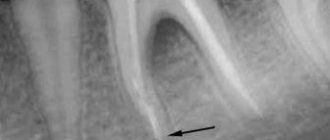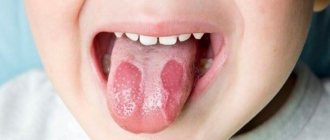Causes of bad breath
People who have never experienced ozostomy often consider the problem to be a consequence of insufficient cleanliness, which is most often completely untrue. In 90% of cases, the cause of halitosis (or halitosis) is bacteria that accumulate in the mouth. The result of their vital activity is sulfur components, which cause a sharp, unpleasant odor. The remaining 10% of cases are associated with diseases of the internal organs, medications or diet.
Types of halitosis
In order to eliminate the problem, you first need to recognize the enemy by sight. So, doctors distinguish several types of halitosis:
- physiological . Its cause is those same anaerobic microorganisms. Moreover, sometimes at a dentist’s appointment it is discovered that the patient’s teeth and gums are absolutely healthy, but the bad smell still persists;
- pathological _ The factors of its occurrence are diseases of the internal organs and clearly visible inflammation in the oral cavity;
- pseudohalitosis . In this case, we are not talking about a strong smell, and those around you do not experience discomfort when communicating. But the patient himself claims that he hears an unpleasant odor. This situation is often observed after successful treatment of osostomy, and is called pseudohalitosis.
How to find out for yourself if there is bad breath?
Of course, others will never tell the patient about such a delicate problem in an adult. Therefore, you can only rely on yourself in the initial diagnosis. It’s good that there are many simple ways to find out whether there is bad breath or not.
The simplest method is to clench your palm into a fist and breathe into it. Then bring your hand to your nose. Do you smell a strong smell? If so, it's time to make an appointment with your doctor! A small plastic spoon will also help detect the presence of odor. Use it to remove plaque on your tongue. After a minute, evaluate the smell. The same can be done with a napkin or cotton pad. True, this method is quite unpleasant to implement.
If using dental floss has long become a habit for you, do not rush to throw it away after use. It’s better to take a closer look: what color is it painted? Yellowness will indicate the presence of bacterial plaque, redness will indicate that the gums are bleeding. You can evaluate the smell of the thread 30 seconds after use. This is how others perceive your breathing.
Good toothpastes and chewing gums skillfully mask even the strongest odor. Therefore, the best time to test for fresh breath is 3 hours after brushing your teeth or eating chewing gum.
Psycho-emotional state disorder
Sometimes halitosis can occur in children after severe excitement.
In some cases, the cause of halitosis may be hidden in the environment that surrounds the child. The fragile psyche reacts too painfully and sensitively to stressful situations, which can be almost invisible to adults, but for a child they are a serious test.
When the nervous system is overexcited, dry mouth, acetonemic crises with all their consequences mentioned above, and digestive disorders are possible.
You need to talk to your child to try to find out the root cause of worries and fears. Maybe he has problems in the children's team (conflicts in the yard, at school or kindergarten). Older children also have more serious problems. Sometimes this syndrome can occur due to failures in studies or during exams.
Children often have problems with their home environment - they experience constant fear of possible punishment for various little things - unassembled toys, something dropped on the floor, etc. He may be afraid to once again disturb adults with a question that worries him, as he may receive an irritated answer.
Such a nervous state often results in various disturbances in the functioning of the child’s body, which can result in bad breath.
If your baby is very worried, give him a slightly acidified drink and calm him down by any available means. Once the environment is normalized and stress is relieved, halitosis should disappear.
Types of bad mouth odors
Sniffing, trying to catch the nuances of the stench is not a pleasant task. But this is the only way to understand which organ is sending the distress signal. Therefore, if the breath freshness test indicates a problem, think about what the smell resembles.
Putrid smell
Its appearance is provoked by bacteria living both in the oral cavity and in the gastrointestinal tract. In the process of processing food residues, microorganisms release waste products, the main component of which is sulfur compounds. This smell is usually very pungent and can be heard over a fairly long distance.
Rotten egg smell
The smell of rotten eggs or meat in 90% of cases causes advanced periodontitis or extensive carious cavities.
If the dentist does not find the problem, you should look for an answer in the gastroenterologist’s office. It is likely that an unpleasant odor is a signal of a malfunction in the digestive system. Sometimes in this way the body informs its owner about excessive consumption of protein foods. During its breakdown, hydrogen sulfide is formed, which has an odor reminiscent of rotten eggs.
Sour smell
The appearance of an acidic smell may indicate a number of unpleasant pathologies. This is exactly what gastritis, duodenal ulcers and chalazia (esophageal insufficiency) “smell” like. If bad breath is accompanied by heartburn and frequent sour belching, you should visit a gastroenterologist: the examination will certainly reveal problems of the gastrointestinal tract.
Smell of acetone
In adults, it is an invariable companion to diabetes mellitus. May indicate poor functioning of the liver, kidneys and thyroid gland. Sometimes the smell of acetone appears during severe acute respiratory diseases. And almost always when fasting and following low-carb diets. In the latter case, you just need to reduce the consumption of protein and too fatty foods, and the smell will go away.
A special case is the smell of acetone from a child’s mouth. The mother of every 5 baby has encountered it at least once. Acetonemic syndrome is a life-threatening condition that occurs against the background of infections, overwork, and after overeating. It requires immediate medical intervention!
Ammonia smell
Ammonia odor is often caused by taking medications containing amino acids. Sometimes it can even be vitamins. Another common cause is a low-carbohydrate diet, which causes the liver and kidneys to work at their limit. In this case, increasing the amount of fluid you drink, preferably water, can improve the situation.
If you are not fasting, drinking enough fluids, and the smell of ammonia from your breath still haunts you, this is a reason to undergo a comprehensive examination. The cause of the unpleasant odor may be diabetes and kidney disease.
Stool smell
Perhaps the most unpleasant is fecal odor from the mouth. Neither the patient himself nor those around him can ignore it. If this is your first time encountering such a problem, remember whether you had wild garlic, onions or garlic on your table. These products can create real hell for those around you.
If several days have passed after consuming them and the smell remains, you should sound the alarm. The smell of feces from the mouth may be the first symptom of diseases of the nasopharynx and upper respiratory tract, tuberculosis, and disorders of the salivary glands. This is the smell that can be heard from experienced smokers and people who abuse alcohol.
Only a doctor can identify the exact cause of the problem. And sometimes, to eliminate bad breath, you will need to undergo a full examination.
20% discount on removing bad breath!
Moscow
Treatment
When the provoking factors are eliminated, the taste of iodine in the mouth disappears quite quickly. If it occurs after taking medications, you should immediately stop taking them.
If the cause of this symptom is any disease, then you need to consult a doctor who, after examination, will prescribe the necessary treatment. If you have stress and overexertion, it is also recommended to consult a specialist .
Medicines
- Antidote sodium thiosulfate, calcium chloride are drugs used by doctors in hospitals for poisoning with iodine-containing products.
- Enterosgel, Polysorb are sorbents that remove excess compounds from the body.
- Thiamazole, Carbimazole, Propylthiouracil - antithyroid drugs used for hyperthyroidism, help reduce the hormonal function of the pancreas.
- Afobazole, Mexidol, Teraligen are antioxidants that eliminate anxiety and nervousness.
- Azafen, Sibazol, Paxil are antidepressants prescribed for prolonged depression.
It is not recommended to select medications on your own, as this can lead to complications and deterioration of health. All medications must be selected by a doctor in accordance with the diagnosis and condition of the patient.
Traditional methods
To lavage the stomach at home, use water with starch or flour dissolved in it , which act as a kind of indicator: the vomit will be blue as long as it contains iodine.
Also, to remove iodine, you can drink milk, water mixed with oil, as well as beet juice, which has absorbent and astringent properties, making it recommended for poisoning.
Decoctions of medicinal herbs are used to remove iodine.:
- 20 grams of elecampane are poured into 1 glass of boiling water and left to steep for 20 minutes. Take 1 tablespoon 4 times a day.
- Add 2 tablespoons of knotweed to 0.5 liters of boiling water and leave in a thermos for 1-2 hours. Then strain the broth and take half a glass 3 times a day.
- 2 tablespoons of dried chamomile flowers are dipped in 0.5 liters of boiling water, infused, allowed to cool and then filtered. Drink half a glass of the decoction throughout the day.
In case of iodine vapor poisoning through the respiratory tract, it is recommended to rinse your mouth, nose and throat with a 2% soda solution.
Treatment with homeopathic remedies
The following homeopathic preparations are used to detoxify the body:
- Ubiquinone compositum is a homeopathic remedy that has antioxidant, detoxification, and anti-inflammatory properties. The drug is administered subcutaneously; a burning sensation may occur during administration, since it contains B vitamins. The product is used for all types of injections. It can also be taken orally, 1 ampoule of 2.2 ml once a week. Prohibited for use during pregnancy.
- Nux vomica-Homaccord is a homeopathic medicine intended for cases of discomfort in the gastrointestinal tract and inflammation of the liver. Apply 30 drops per day in 3 doses under the tongue. Before use, it must be diluted with 1 teaspoon of boiled water. Contraindicated for pregnant women. An allergic reaction may occur due to individual intolerance to the components of the drug.
- Chitosan is the strongest sorbent of natural origin. Its composition consists of sprouted grains of wheat, oats, and corn. It also contains plant enzymes, proteins, vitamins and phytohormones. Being a completely natural remedy, this drug does not cause allergies or side effects. It should be taken in a course of 30-45 days, in the morning an hour before meals and in the evening 2 hours after meals.
You should not ignore the iodine odor in your mouth, especially if it appears suddenly and persists for a long time. Such a symptom may indicate a disease or malfunction in the body. In such cases, it is better not to self-medicate, but to contact a specialist who will conduct an examination and, if necessary, prescribe the necessary treatment.
What diseases cause bad breath?
Trying to diagnose yourself is a thankless task; the range of diseases that can manifest themselves through bad breath is too wide.
Dental diseases
This is the first thing that comes to the mind of a person who has once discovered a problem. Indeed, the most common cause of a pungent odor is caries. Food debris accumulates in carious cavities and pathogenic bacteria multiply. Inflammation of the soft tissues of the oral cavity will also be a real gift for such microorganisms:
- gingivitis;
- periodontal disease;
- periodontitis.
Those patients who periodically turn to dentists for teeth cleaning know that removing tartar is always accompanied by an unpleasant odor. The rest do not even suspect that entire colonies of bacteria accumulate in the interdental space.
Harmless, at first glance, plaque slowly but surely turns into tartar, which not only causes an undesirable odor, but also creates periodontal pockets. Gradually going deeper, they expose the roots of the teeth. The teeth themselves become loose and subsequently fall out.
To avoid such a scenario, preventive visits to the dentist should become the norm for every patient. And if you have bad breath, you should not postpone your visit to the dental center for more than a few days. If the doctor does not identify problems with teeth and gums, you will have to look for the cause of halitosis from other specialists.
Diabetes
If the teeth are healthy and the breath smells of acetone, the therapist will immediately refer the patient to an endocrinologist, because this is how diabetes mellitus usually begins to manifest itself. With this pathology, glucose does not enter the body's cells, but accumulates in the blood. The cells, in turn, feel energy hunger. To saturate them, the body rapidly breaks down fats and proteins, which leads to the production of acetone.
The diagnosis can be confirmed by a urine and blood test, which will certainly contain ketone bodies. Ignoring the smell of acetone on your breath can lead to hyperglycemic coma and even death.
Liver and gallbladder diseases
Gallstones, cholecystitis and bile stagnation make themselves felt by the appearance of bad breath. Usually in this case the smell is not so strong that the patient pays attention to it. He is much more worried about the bitter, unpleasant taste in his mouth, as well as pain in the right hypochondrium, often radiating to the back.
However, the “liver” smell is easy to recognize: it is sweetish, and somewhat reminiscent of the smell of raw liver. When it becomes putrid, the organ has ceased to cope with its functions, and it is likely that the patient will be diagnosed with hepatitis or cirrhosis. To establish a diagnosis, an ultrasound must be performed and a blood test taken for bilirubin and liver enzymes.
Thyroid
An unpleasant odor may also appear due to disturbances in the functioning of the thyroid gland. An increase or decrease in its functions is observed in 2% of the population of our planet. Diseases of this organ begin almost imperceptibly and proceed without any special manifestations. One of the first alarm bells is the smell of iodine coming from your mouth.
Kidney diseases
You can suspect problems with the kidneys by bad breath, which clearly resembles urine. In this case, we can talk about a violation of protein metabolism. Metabolism is disrupted, and the end products of protein breakdown are excreted through the lungs. The ammonia odor is intense, although no toxins are detected in the exhaled air.
Gastrointestinal problems
Accompanied by heartburn, belching and pain in the epigastric region, an unpleasant sour breath almost always indicates diseases such as gastritis or a stomach ulcer. Problems with the intestines are also possible, for example, dysbiosis (disturbance of the microflora), which often occurs while taking antibiotics and other medications.
Pathology of the respiratory system
A putrid odor can be caused by diseases of the respiratory system such as:
- enlarged adenoids;
- tonsillitis;
- chronic sinusitis;
- angina;
- sinus inflammation;
- bronchitis;
- purulent otitis;
- pneumonia.
An unpleasant odor indicates that an inflammatory process is in full swing in the body, which requires urgent medical attention.
Important! Regardless of the cause of bad breath, once the disease that caused the symptom is completely cured, it completely disappears. This is why it is so important to determine the cause of halitosis, and not try to mask the problem with air fresheners.
Unpleasant smell in the morning
During sleep, all processes in the body, if they do not freeze, then occur much more slowly than during wakefulness. This also applies to the work of the glands responsible for the production of saliva. But this process is one of the most important factors in the fight against bad breath.
During sleep, the volume of saliva production decreases significantly. It becomes insufficient to protect teeth and gums from pathogenic bacteria. As a result, after a few hours of sleep, the concentration of microorganisms increases several times, and their waste products create a not very pleasant odor.
The human oral cavity is home to a huge variety of bacteria. Depending on the species, they can cause the smell of cadaverine and hydrogen sulfide, methyl mercaptan and putrescine. In other words, during the night a whole “bouquet” of terrifying aromas accumulates in the mouth, which makes morning kisses far from the most romantic.
What causes excess iodine in the body?
Iodism is a pathological condition in which adverse reactions occur from exceeding the safe level of iodine in the human body. According to doctors, the dose of this substance should be 4-5 times higher than the daily norm. In addition, adverse reactions appear only from the absorption of iodine in a short period of time. For a healthy adult, the norm is 200–1000 mg. In children, it should not exceed 200 mg. It is important to consider the child’s age and health status. In the first years of a baby’s life, the immune system is weak and susceptible to any irritants. With the transition to artificial feeding, and then to solid food, the baby’s body receives a large number of different microelements in large and unusual volumes. Among them is iodine.
Iodomarin poisoning can occur if the dose does not correspond to the child’s weight
If a child has been eating solid food for a long time, one option for signs of iodism to appear is to eat fatty fish, oysters, shrimp and other foods rich in iodine. The causes of this pathological condition can also be caused by factors not related to the intake of a particular food.
These include:
- long stay on the sea coast (rest or simple walks);
- taking medications that contain iodine;
- disruptions of the gastrointestinal tract caused by Klebsiella bacteria.
Lots of seafood can cause iodine odor
Other causes of unpleasant odor
In addition to the reasons already listed, strong breath can be caused by:
- Poor nutrition
. Namely, consuming large quantities of dairy and meat products. Such a diet radically changes the acid-base balance, which serves as a favorable environment for the development of microorganisms that cause an unpleasant odor. You can reduce its intensity by simply adding foods containing carbohydrates to your diet. - Hormonal disbalance
. Any hormonal “swing” immediately affects the quality of saliva. It becomes more viscous, loses oxygen, which in turn contributes to the appearance of stench. - Smoking
. Fans of this addiction should know that the mucous membrane of their oral cavity becomes dry. And with dry mouth comes an unpleasant odor. - Poor quality hygiene products
. Incorrectly selected brushes or pastes can also be the culprit of the problem. The ideal choice is maneuverable brushes with normal stiffness and a mobile head. - Insufficient oral care
. The process of brushing your teeth should occur at least twice a day: in the morning and before bed. - Dentures, veneers, crowns, and even piercings
can also become activators of bad breath. All these items require careful care, as bacterial plaque and food debris constantly accumulate around them and under them.
What should parents be wary of?
If your breath smells like iodine, this should alert parents. In addition to the unpleasant aroma, other problems arise. What other symptoms indicate an excess of iodine in the body:
- burning sensation in the throat;
- a sore throat;
- intestinal tract disorders;
- the mucous membranes of the oral cavity are dry;
- dizziness;
- attacks of periodic nausea.
It is important to monitor children's health. If these symptoms appear, you should further examine the oral cavity. If the mucous membrane darkens, you should immediately visit a doctor.
Treatment of bad breath
Osostomy is a serious problem that requires an integrated approach. Therefore, do not be surprised if your dentist recommends using several treatment methods at once:
- Scrapers
. There is nothing much more effective than constantly cleaning the surface of the tongue. Ideally, after every meal. This will help significantly reduce the number of bacteria growing in your mouth. - Rinse aids
. They deal with bacteria much more effectively than chewing gum. But to feel the effect, you need to rinse your mouth for at least 30 seconds. - Toothpastes and gels
. A properly selected toothpaste or gel for cleaning teeth is already half the guarantee of getting rid of odor. - Toothpicks.
The systematic use of these sticks helps to get rid of food particles stuck in the interdental space. - Toothbrushes
. Dentists all over the world recommend using ultrasonic brushes, whose bristles are capable of cleaning the most inaccessible places. - Flosses
. Dental floss is becoming increasingly popular. This is an excellent tool for cleaning the interdental space, which leaves no chance for bacteria.
All of the above methods will be effective only in one case: if there are no teeth damaged by caries in the oral cavity, and the gums are healthy. Therefore, the first thing to do if an unpleasant odor occurs is to undergo complete dental treatment.
Folk remedies
Traditional medicine can also cure halitosis. Moreover, in her arsenal there are no fewer tools than a dentist can offer. Thus, rinsing the mouth with water and adding a few drops of propolis tincture gives good results. For the same purpose, you can use an infusion of dried apricots, mint or strawberries.
It is quite effective to consume anise seeds daily on an empty stomach. And if you couldn’t find them, you can easily replace the anise seeds with two apples. The main thing is to rinse your mouth with warm water first.
After each meal, it is useful to eat half a teaspoon of grated ginger. But this recipe is not suitable for those patients who suffer from gastrointestinal diseases. In this case, it is better to simply chew or eat a couple of basil leaves. If bad breath is caused by sinusitis, traditional medicine recommends moistening cotton balls with celandine infusion and inserting them into the nostrils for 10 minutes. It will also be useful to replace store-bought rinses with decoctions of chamomile, sage or calendula.
Prevention
The best prevention of halitosis is following all the rules of hygiene: choosing the right brush and toothpaste, brushing your teeth and tongue twice a day, using floss and rinses, and regular visits to the dentist. In addition to these procedures, it is important to ensure that the diet is balanced and the intake of fluid into the body is sufficient.
Preventive measures
If your baby's mouth smells like iodine, this condition can be prevented. Parents must monitor the child’s health: be sure to wash their hands before eating food using hot water, ensure the cleanliness of vegetables and fruits (they must be thoroughly washed), give the baby only purified drinking water, monitor the condition of the food that is intended for the child’s consumption.
If alarming symptoms appear that may indicate pathologies in the body, consult a doctor in a timely manner to find out the condition in which they appear.
Chief author and editor-in-chief: Makarskaya S.E., 29 years of experience.
Last revision: 01/07/2018
Which doctor should I contact?
If an unpleasant odor appears, the first step should be a visit to the dentist. This doctor will be able to help in the vast majority of cases. If no problem is detected, it is the turn of a nutritionist and gastroenterologist. Most likely, in this case, you will have to take additional blood and urine tests. Depending on the results obtained, a specific specialist will treat the problem: for problems with the thyroid gland - an endocrinologist, for kidney diseases - a urologist, for pathologies of the respiratory system - an ENT specialist or a pulmonologist.
You can get rid of an unpleasant odor only by establishing an accurate diagnosis. Therefore, if the problem persists longer than 2-3 days, it’s time to start an examination!
Author: Elena Kopylova Dentist-therapist, endodontist. Work experience more than 8 years.
The information is for reference only. Before treatment, consultation with a doctor is necessary.









